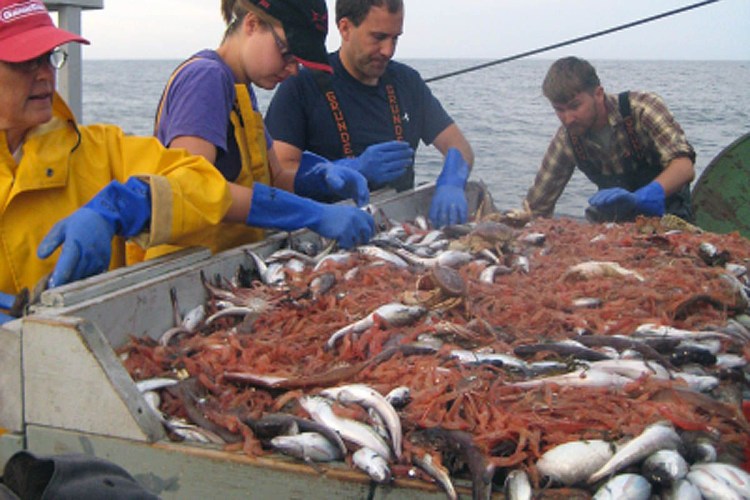BAR HARBOR — Maine’s shrimp fishery has been closed for nearly a decade since the stock’s collapse in 2013. Scientists are now saying a species of squid that came into the Gulf of Maine during a historic ocean heatwave the year before may have been a “major player” in the shrimp’s downturn.
In 2012, the Gulf of Maine experienced some of its warmest temperatures in decades. Within a couple of years, the cold-water-loving northern shrimp had rapidly declined and the fishery, a small but valued source of income for fishermen in the offseason, closed.
Anne Richards, a biologist at the Northeast Fisheries Science Center in Woods Hole, Massachusetts, and Margaret Hunter, a biologist with the Maine Department of Marine Resources, studied the collapse and found that it coincided with an influx of longfin squid, a major shrimp predator.
The squid is a “voracious and opportunistic” predator that Richards and Hunter believe expanded in the gulf during the heatwave at the same time the shrimp population was struggling because of warmer water temperatures.
“It certainly could explain why shrimp declined so rapidly,” said Hunter last week.
Shrimp were under duress heading into 2012. The survival of baby shrimp depends on a large number of shrimp reproducing and cold ocean temperatures. In 2012, waters in the region were two degrees Celsius above the 1982-2011 average and remained above average all year.
But the warm temperatures alone don’t seem to explain the collapse of the fishery in one year, Richards and Hunter said. They looked at data from commercial fishing, ecosystem monitoring and surveys in the Gulf of Maine and found that the shrimp hadn’t simply moved to other parts of the gulf, nor did commercial fishing wipe them out.
Of 11 predator species that had a population peak in 2012, longfin squid were the only ones that clearly increased in the areas where shrimp were present. The early onset of spring in the gulf that year also meant that female shrimp were still inshore at a time when they normally would have left. This change in patterns allowed for a rare overlap with the longfin squid’s arrival and made the shrimp more vulnerable.
“They haven’t overlapped a great deal until that year,” said Hunter.
The biologists don’t know exactly how large the increase in longfin squid was, nor do they have evidence from the stomachs of squid to make the hypothesis ironclad.
“It’s a theory,” Hunter said. “We can’t ever really prove it.”
The shrimp population has never really recovered, and researchers are still trying to figure out what factors are blocking the rebound.
“That’s a big mystery,” Hunter said. “We’re pretty sure it has to do with temperature.”
But the finding does highlight that climate change is much more complicated than merely rising water temperatures. It is causing food webs to shift and creating new interactions between species that can be catastrophic, the researchers wrote in the study.
“It just highlights how unpredictable the effects of climate change may be,” Hunter said.
The current moratorium on shrimping is scheduled to end this year. Fishery regulators are expected to decide whether to continue it this winter.
Shrimpers have urged officials to reopen the fishery to see what’s out there. If there aren’t enough shrimp, they won’t bother with the effort of rigging up and going out.
James West, a fisherman from Sorrento, went shrimping for years until the fishery closed. He didn’t remember catching any squid back then but hopes regulators will let him go fishing again, even if only on a limited basis.
“I still think there are shrimp out there,” he said.
Send questions/comments to the editors.



Comments are no longer available on this story